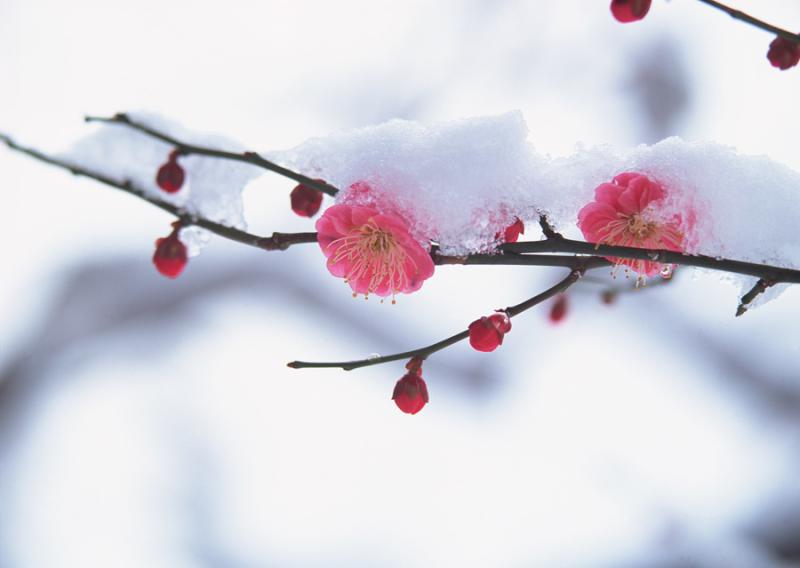24 Solar Terms: 6 things about Major Snow


24 Solar Terms: 6 things about Major Snow

[Photo/VCG]
The traditional Chinese lunar calendar divides the year into 24 solar terms. Major Snow (Chinese: 大雪), the 21st solar term of the year, begins this year on Dec 7 and ends on Dec 21.
During Major Snow, the snow becomes heavy and begins to accumulate on the ground. The temperature drops significantly.
Here are six things you should know about Major Snow.

[Photo/VCG]
Snowy winter
The snow in North China may last a whole day, breaking tree branches and blocking the road. The natural scenery is "hundreds of leagues ice-bound go; over thousands of leagues flies snow". In the south, snowflakes fall and the world turns white.
A proverb about the snow says, "A timely snow promises a good harvest". As the snow covers the ground, the low winter temperature kills pests.

[Photo/VCG]
Appreciating plum blossoms
Plum blossoms usually flower in mid-to-late December in some southern cities of China, and sometimes bloom even earlier. The plum blossom, which originated in China, is revered in Chinese culture for its resilience during severe winters. Along with the pine and bamboo, the plum blossom is considered one of the Three Friends of Winter.

[Photo/VCG]
Eating lamb
Lamb is a favorite food for Chinese people during Major Snow. It's excellent for nourishing the body, promoting blood circulation and providing protection against the cold. People in Chongqing like to have potted lamb soup or stewed lamb soup with their families and friends. Nanjing residents like to stew lamb with yams or wolfberries to make it more nutritious.

[Photo/VCG]
Making sausages
During Major Snow, people in southern China, including Nanjing, Hangzhou, Hefei and Chongqing, make sausages, an important part of preparation for Spring Festival.
The best meat for sausage comes from the butt of the pig. The sausage should be dried in a well-ventilated place in the shade, and is edible after a week. Cut off a certain amount, and boil or fry it as you like.

[Photo/VCG]
Eating porridge
Hot porridge could help warm you and nourish your body in cold weather. In China, it's customary to eat red bean porridge on the first day of Major Snow and eight-treasure porridge on the eighth day of the last month of the lunar year. In addition, there are other varieties such as wheat porridge, sesame porridge, radish porridge, walnut porridge and tuckahoe porridge.

[Photo/VCG]
Preventing respiratory illness
During this period, Chinese people watch for outbreaks of respiratory illness, which can be prevented by wearing a warm scarf to protect the neck and properly drinking water. During Major Snow, it's drier and colder, so people should drink more water. But you should not drink too much water at once. At the same time, don't drink cold water after exercise.




You will notice that the text with the photo of the lamb stew and the one of the sausages particularly mention Chongqing, where I live. Tomorrow my wife's daughter comes home from her studies in Germany for a month, and so in a few days we will go to a restaurant to eat some of that delicious looking lamb stew. Lamb is my favourite meat. And after that my wife will travel to the suburban village where her family's farm is located to purchase a bunch of those sausages, and they are really something. As for the porridge, I eat hot Australian oats cereal every couple or few days anyway. One thing I really like about special Chinese seasons and holidays is the fantastic food.
Dear Brother Buzz: It all looks and sounds amazing.
Snow in winter seems a good idea.
I wonder how we here in upstate NY can get in on this action?
As of yesterday, 12/07/2019 we have had 28 inches of snow to date.
Somehow I feel left out.
Smiles.
Enjoy the beauty of the season, and the good warm savory nourishment which accompanies it.
P&AB.
Enoch.
Thanks Enoch. Although when I was living farther north in Zhengzhou there was snow, but then while I've been living first in Chengdu and now in Chongqing, which is a more tropical area, there has been no snow at all. Keep in mind that for most of my life I lived in the snow belt that also envelops Buffalo, and now I'm happy to never see snow again.
Dear Brother Buzz: I believe you can live without it.
We have thought of moving to Alaska to avoid any more harsh upstate NY winters.
Think of us under a palm tree sipping Coco Loco's and nibbling on local tropical fruits in Anchorage.
Ah, the dream carries on.
P&AB.
Enoch.
An excellent thought Buzz, but with one major exception. The kind of snow shown in the first and second pictures is very beautiful and artistic. As long as I see it outside the window of a warm room, I just love it. However, when I have to go outside to shovel it or drive in it, the attraction dims very quickly.
The idea of doing an article about each of the seasonal changes sounds great, especially if you can get pictures of each one.
It appears that every (approximately) two-week period has a different name and description, and I assume all of the articles about them will be similar to this one. I hope the China Daily keeps repeating them, because I know I've already missed a number of them already.
China Daily publishes a series of all 24 "Solar Terms" as they are encountered, and now seeing how interesting they are I will post each one on NT as it comes up.